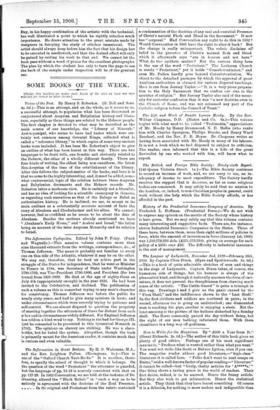The Reformation in Great Britain. By H. 0. Wakeman, M.A.,
and the Rev. Leighton Pullen. (Rivingtons. 'ls.)—This is one of the " Oxford Church Text-Books." It is needless, there- fore, to specify the school of thought to which it belongs. On the question of the word " Protestant " the utterance is guarded, but the language of pp. 12-13 is scarcely consistent with that on pp.127-28. In 1662 Convocation, we are told. at the instance of Dr. Gunning, altered the "Black Rubric" in "such a way as to be entirely in agreement with the doctrine of the Real Presence;
. In its original and Protestant form the rubric contained a condemnation of the doctrine of any real and essential Presence of Christ's natural Flesh and Blood in the Sacrament." It now has " corporal." Had Convocation any right to do this in 1662 ? Would Convocation in 1901 have the right to alter it back ? But the change is really unimportant. The rubric disclaims all belief in the presence of Christ's natural flesh and blood which it afterwards says "are in heaven and not here." What do the epithets matter ? But the curious thing here is the use of the word " Protestant." The Lutheran Church is surely " Protestant," yet it holds "Consubstantiation," and even Mr. Pullen hardly goes beyond Consubstantiation. We object to the detached passages by which the approval of great Anglican authorities is claimed for various disputed teachings. Here is one from Jeremy Taylor :—" It is a very pious prepara- tion to the Holy Sacrament that we confess our sins to the minister of religion." But Jeremy Taylor also said of the neces- sity for auricular confession that it was "a new doctrine even in the Church of Rome, and was not esteemed any part of the Catholic religion before the Council of Trent."






































 Previous page
Previous page